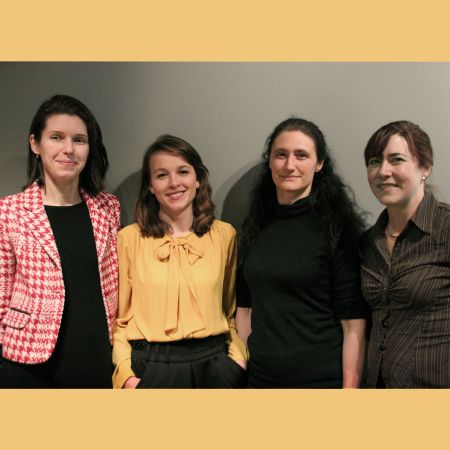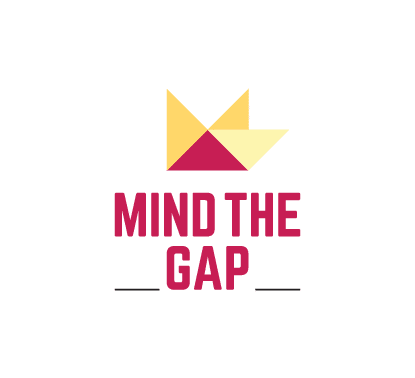Meet the Mind the Gap Team

Viktorija Kravcova,Karolina Decker, Kirsty Pollock and Leitha Matz (left to right) are the cofounders of Mind the Gap, an organisation dedicated to empowering and encouraging women by sharing knowledge about wealth and finance. Here, the team talk about their diverse backgrounds and motivations, and the importance of transparency and negotiation skills in closing the gender gap.
First, some introductions.
KD: I studied finance and banking. I worked for a number of banks in Poland and Germany. In 2012, I met my husband and moved to Berlin, where I started working for Deutsche Bank in the compliance department. I have long been thinking about starting something like Mind the Gap, and finally launched it last year, while on maternity leave with my second child. I’m very active in the financial world, and noticed there are only men there. Why? Why aren’t women talking about this topic? I met Leitha, and together we decided to start a community to help women talk about finance. Viktorija and Kirsty were among our first event members, and they came to us and asked to be involved.
LM: I’m COO and cofounder of a fintech company called Zuper, and have worked in technology for 20 years. It’s always been exciting, but it hasn’t always been fair or easy. I got really passionate about women and money as I got into management. Once I started hiring, I realised that women come into a job and don’t ask for any benefits. I would offer a woman a job and she would simply accept; whereas, when offered the very same job, a man would ask about compensation. I realised there was something going on. As much as I could do as a manager to make things equivalent for my team, it’s not enough, because this is happening all over the place. When I met Karolina, we started talking about this topic and how passionate we both were about it. It seemed like a good idea to talk about it: To turn it from a private issue to a public discussion.
I was really looking for a niche where things could be done to empower women.
KP: I’ve been a software developer and IT consultant for most of my working life, and I also write and perform rock songs. I worked as a consultant for investment banks in City of London, and gained a background interested in investing from my parents. I’ve always been very aware that money is power. When you’ve saved, invested or at least have control over your debt and expenses, you can walk away from a job if you’re being badly treated. I have done this several times in my life! It’s only something you can do if you’ve got control over your debts and expenses. Power is something that women particularly need and are short of, because of the gender pay gap. If you have an equal amount of money, you can almost have an equal status in the world. Almost…
VK: As art director and graphic designer, I’m the creative part of the team. I have a background in psychology. While growing up, I never noticed gender inequality: I saw my friends have issues, but put them down to individual personalities rather than a systemic problem. At some point, though I realised there is a gender difference. I started my own initiative for women’s empowerment, but was really looking for a niche where things could be done. I came to the very first MtG Meetup and thought it was amazing. I’m not so experienced in the financial world, but bring creativity to help women act; to motivate them and give them the tools to change things.
Why do we need to talk more about money, wealth and salary?
KD: At the moment, only two percent of financial advisors recognise the need to tailor their services to women. Finance is complex. There is no transparency. It’s a boy’s club; women don’t have a seat at the table.
Women have only been allowed to open a bank account since 1972. In many European countries, there’s still a mindset that women are linked to family. But actually, it’s not so difficult to start doing personal budgeting. I think many women need this “aha moment”—something has to happen in their personal or financial life, where they realise that it’s important to be accountable for their own finances. In an ideal world, we’d start with the younger generation. We don’t learn how to manage money at school—how to set up a bank account, how to start saving, how to invest.
Finance is complex. There is no transparency. It’s a boy’s club; women don’t have a seat at the table.
KP: Here in Germany, job salaries are not advertised. It drives me mad. We don’t talk about money until the very end of the application process—and you have to give them a figure. I wasn’t used to it, and I consider myself quite bolshy. It would be a good start to see a salary range upfront in job ads. Money may be power, but so is knowledge. I’m surprised when I find out that people don’t know what their market value is. I’ve been a job-hopper because of just that, and was able to double my salary every couple of years by going from job to job. When people find out what’s going on, if they know there’s a massive gap between what different people are getting paid, then change will have to happen. It puts the power back into our hands, rather than the hands of companies.
LM: I had an early lesson in this. Working in the accounting dept of a company, I noticed discrepancies: people who work their way up slowly through a company and spend a long time there are paid much less than people who job hop. I mentioned this out loud and was removed from the role. The experience taught me how secrecy benefits companies, and how much that hurts individuals: They have no idea they’ve fallen behind or could have asked for more money.
Why are negotiation skills important?
LM: Having a bit of money in the bank means you can walk taller, or walk away. Knowing that no matter what happens, you’re fine. As a manager, I know there is sometimes a cap on what you can offer people, but as an employee there are always other things you can ask for—time off, a bonus in six months, revenue share. There are many ways you can divide the pie so you get fair compensation. Know what your value is, know what the market rate is. You can find those things out. Once you know, you can stand up for yourself.
It’s about building that confidence. Once piece of advice I always give women is this: Pretend you’re negotiating on behalf of a woman you care about. It puts you in a different frame of mind. Give yourself the advocacy you would give to one of your closest friends.
KP: Know what value you’ve added to the company, and put it in terms that management understands. If you are their best salesperson, make that clear. If you’re not providing value then ask yourself: Do I need more training? Where could I add more value?
Having a bit of money in the bank means you can walk taller, or walk away.
KD: The problem at the moment is that women don’t feel confident with this whole money topic. We don’t ask for a raise. A lot of the time, women start with a lower salary because they don’t negotiate at the outset. At MtG, we can help women learn how to negotiate, be confident about what they bring to the company, and what they can get in return.
What does Mind the Gap mean to you?
KD: I really feel that with these events, we can change something. We can show women that money needn’t be a source of stress and worry. We can explain in an easy and entertaining way. That’s why we don’t charge for events—it goes against the whole concept. As a mother, I’ve realised even more why it’s so important to take care of finances. I’m thinking about my children—they are the trigger for all this, actually. We noticed at the first event that there are many interested women who want to know more.
LM: For me it’s about having these conversations in a public setting: The ability to ask any question you like, to get clarification, and connect with people.
KP: It’s about knowledge and the exchange of knowledge, and the feeling of being able to really help someone by sharing your own insight. We have people here with all levels of knowledge, and you can always find someone who knows more or less than you about a particular topic, so there’s the chance both to learn and give back. You can have a conversation in this safe setting where everyone is advocating for each other
VK: It’s so different from what I do in my career. Talking about money really is sexy. Now I get why men like to do it! I even feel powerful just talking about it, whether or not I actually have it. I feel like we’re getting closer. The fight for gender equality went quiet for awhile, but now the door is opening again.
It’s about knowledge and the exchange of knowledge, and the feeling of being able to really help someone by sharing your own insight.
Your top piece of advice for women who want to take control of their finances?
LM: The women I know tend to prioritise everything before themselves. This has an impact on their investments. So, you have to make it a priority. Don’t put it aside.
KP: Know where your money is coming from, and know where it is going. As I keep saying, knowledge is power.
KD: Start doing your personal budgeting, and start now. Just use Excel, log your income and spending and try to figure out how you can save a little.
VK: We as women work very hard to make our money. It’s time to start making money work for you.


